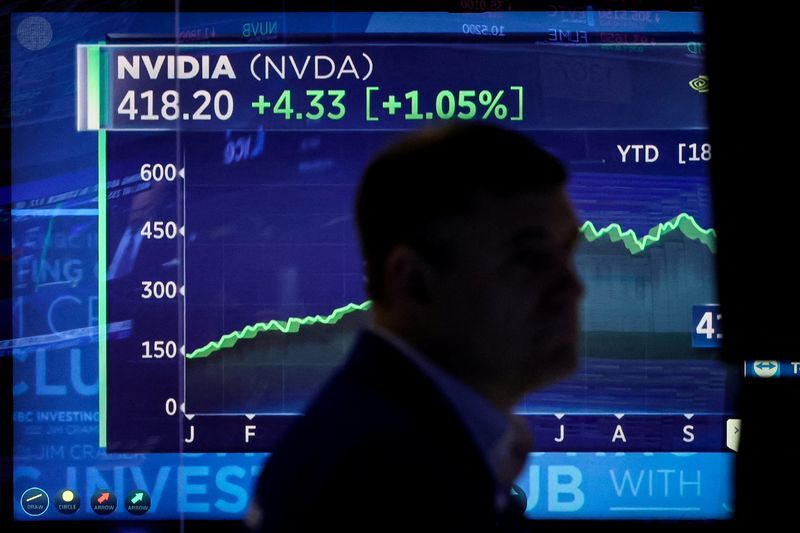
(Reuters) – One of the world’s largest technology funds is set to ramp up its exposure to Nvidia, which has become the world’s most valuable company following a blistering run in its shares.
The $72.34 billion Technology Select Sector SPDR Fund, managed by State Street Global Advisors, will buy some $10 billion shares of Nvidia while slashing its exposure to Apple, Matthew Bartolini, head of SPDR Americas research at State Street confirmed.
The changes are being made so the fund can bring its holdings inline with pending changes to the S&P Dow Jones Technology Select Sector index, which it tracks. The reshuffle would leave Microsoft and Nvidia sharing the top spot in both the fund and the index, with Apple becoming the runner-up, according to Bartolini.
On Tuesday, chipmaker Nvidia became the world’s most valuable company as its market value hit $3.33 trillion, surpassing that of Microsoft.
Until now, the technology ETF had 22.5% of its assets invested in Microsoft, 21% in Apple, and only 6% in Nvidia, according to Jay Woods, chief global strategist at Freedom Capital Markets. That caused the fund to underperform its benchmark as Nvidia’s shares rose 173% this year.
By the end of trading this Friday, when the index rebalancing takes place based on last Friday’s market cap values, Microsoft will retain its dominance within the SPDR ETF’s portfolio, with a 21% weighting. Nvidia will have a 21% weighting as well, while Apple will plunge to 4.5%.
Nvidia’s shares were recently up 3.7% at $135.85 while Apple’s were off 1.5% at $213.33.
“The fact that Nvidia is up and Apple shares are down today may reflect that a rebalancing” in the ETF already is underway, Steve Sosnick, chief strategist at Interactive Brokers.
Index and portfolio construction rules mean that only two of the three technology giants can be held at a full weight — 21% — in the ETF. Any other large positions can’t exceed 4.5%. The rule, set in place in 1998 when the index was launched, caps total exposure to all stocks with a weighting of more than 5% in the broader Standard & Poor’s 500 index at 50% of the portfolio.
The fact that three technology giants are vying for the top two spots in the ETF’s portfolio is “unprecedented,” Bartolini noted.
(Reporting by Suzanne McGee, additional reporting by Lisa Pauline Mattackal; Editing by Sharon Singleton)
 BeritaKini.biz Berita Viral Terkini di Malaysia
BeritaKini.biz Berita Viral Terkini di Malaysia




